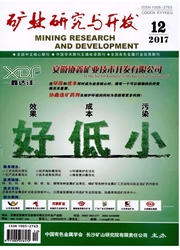

 中文摘要:
中文摘要:
以页岩为研究对象,分别采用多元线性回归(MLR)及最小二乘支持向量机(LS—SVM)建立了页岩的单轴抗压强度及抗拉强度预测模型,考虑的间接指标包括:岩石密度、点荷栽强度及纵波波速,并对上述两种预测模型进行了性能检验及比较。结果表明:页岩强度与密度、点荷栽强度、纵波波速呈较好的线性关系,相关系数均大于0.89;MLR和LS—SVM方法均可得到较高精度的强度值,但单轴抗压强度的预测精度比抗拉强度高,更适合于抗压强度的预测。两类模型在预测岩石单轴抗压强度时效果相当,但LS—SVM方法更适合于抗拉强度的预测。
 英文摘要:
英文摘要:
Taking shale as the research object, considering the rock density, point load strength and P--wave velocity, pre- diction models of uniaxial compressive strength and tensile strength were built by multiple linear regression (MLR) and least squares support vector machine (LS--SVM). And their performances were tested and compared. The results showed that the strength of shale had good linear relations with rock density, point load strength and P--wave velocity, and the correlation coefficients were all greater than 0.89. MLR and LS--SVM could both obtain strength values with high accu- racy. But the prediction accuracy of uniaxial compressive strength was higher than that of tensile strength, which proved that MLR and LS--SVM was much more suitable to predict compressive strength. The performances of two methods were equivalent for predicting compressive strength, while LS--SVM method was much more suitable to predict tensile strength.
 同期刊论文项目
同期刊论文项目
 同项目期刊论文
同项目期刊论文
 期刊信息
期刊信息
